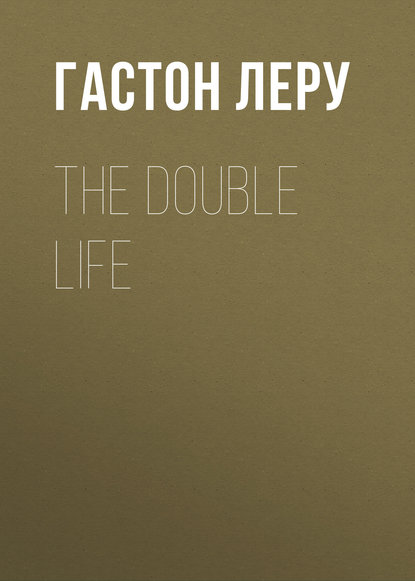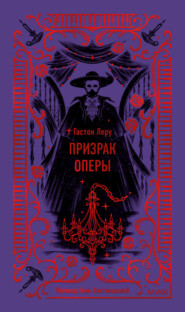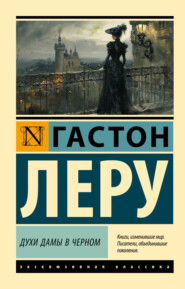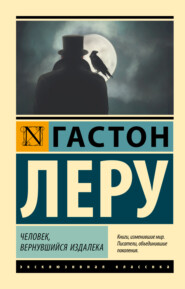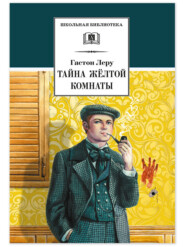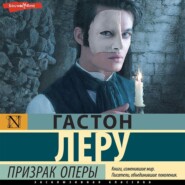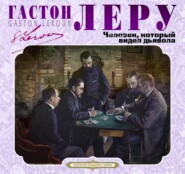По всем вопросам обращайтесь на: info@litportal.ru
(©) 2003-2024.
✖
The Double Life
Автор
Год написания книги
2018
Настройки чтения
Размер шрифта
Высота строк
Поля
“To the house of one of my friends in the Rue Huchette.”
When they reached the house in the Rue Huchette, they passed under a red porch, and into a very old house. Adolphe seemed to know the people, for he did not wait to be ushered in. He made Théophraste climb half a dozen stone steps which were extremely worn, and pushed open a thick door which was at the end of the court.
They were now in a sort of vestibule, lighted by a large lamp in the shape of a huge ball, suspended by iron chains from the stone ceiling.
“Wait for me here,” said Adolphe, after having closed the door by which they had entered. He promised not to be long and disappeared.
Théophraste seated himself in a large armchair, and looked around him. What he saw on the wall amused him. There was an incredible quantity of words painted in black letters. They seemed to cover the whole surface of the wall, in no sort of order at all. He spelt some of them. There was Iris, Thabet, Rush, Jakin, Bokez, Thebe, Paracaler, and the word “Iboah,” which appeared in many places. Turning toward the other wall, against which he had been leaning, he saw a Sphinx and the Pyramids.
An immense arch arose, and in the center of this was Christ, His arms extended out into a circle of flowers. On the arch were the words, “Amphitheater of the wise eternal son of Truth.” It was the arch of the “Rose Cross.” Below was this inscription, “There are none so blind as those who will not see.” Looking around he came across another inscription, in letters of gold: “As soon as you have won a fact, apply yourself to it with your whole mind. Look for the salient points in it. Behold the knowledge which is in it. Give way to the hypothesis. Hunt for the fault in it.” (Instructions to the clinic of the Hotel Dieu, Prof. Trousseau.) Besides this he saw figures of forles and vultures and jackals, men with birds’ heads, beetles, and the emblem of Osiris-an ass, and an eye. Finally he read these words in blue letters: “The more the soul is rooted in her instincts, the more will she be forgotten in the flesh, the less consciousness she will have of her immortality, and the more she will remain a prisoner in living corpses.”
Impatient at the absence of his friend, and becoming a little frightened, he attempted to raise the drapery behind which Adolphe had disappeared. But as he ascended the step his head struck an object which was suspended in the air, and looking up he found it was a skeleton.
We have said that M. Lecamus had applied himself to the occult sciences, and practiced spiritualism, but from what we know of M. Lecamus’ character, we feel that he was only an amateur in these things. He only practiced spiritualism for show, for snobbery, and to make an impression at the parties which he used to frequent. He believed no more in spiritualism than he believed in love. The day came, however, when his heart gave way, and when his spirit humiliated itself. It was the day that he met Marceline and M. Eliphaste de St. Elm. He met Marceline at a seance, where they had made him the father spirit. At this séance M. Eliphaste was recognized as the chief. However, this gentleman was rarely seen. He led a most retired and mysterious life at the foot of the Rue Huchette.
Marceline had attended this seance by the will of M. Longuet, who, having been to the Salon Pneumatics, insisted that Marceline should be presented there. He thought that it was a kind of worldly society, where such subjects as pneuma-tology were discussed.
The day that Marceline made her entrance to the Salon M. Eliphaste de St. Elm was to read a paper on the Gourse. Mme. Longuet found herself by chance next to M. Lecamus, and after discussing a good many points in the lecture, they found that they had a great many things in common, and by a curious chance M. Lecamus discovered that he was an old college chum of M. Longuet’s. It was thus that he became welcomed into the family circle of M. Longuet.
This preamble is necessary for us to understand the presence of M. Lecamus and Marceline together in the house of M. Eliphaste de St. Elm, at the foot of the Rue de Huchette, while Théophraste was waiting for him wearily in the vestibule. The visit was the result of a conversation between M. Lecamus and Mme. Longuet, early that morning. She had hidden nothing from him regarding the events of the nights before, and the history of Signor Petito’s ears showed to M. Lecamus the necessity of taking precautions against the spirit of Cartouche. At the bottom of his heart M. Lecamus felt to a certain extent guilty for the follies of Théophraste, and he had been asking himself, lately, just how far he could let this reincarnated soul go, for M. Lecamus was a novice at spiritualism, and it was his intention to experiment with Théophraste and Cartouche.
He was no sooner assured of having in his hands a reincarnated soul, than his curiosity aroused in him a desire to make use of it. This was exactly what he had done in putting the reincarnated soul of Cartouche before his portrait, without taking any precautions, and now he did not know how he could stop that which he had unconsciously set in motion. He knew how to arouse such a spirit, but he did not know how to stop it.
It was for this reason that he and Mme. Longuet had come this morning to beg M. St. Elm to exercise his influence, for there was not a cleverer guide for reincarnated souls in Paris.
In the meantime, Théophraste had been locked up in the vestibule, and when he struck his head against the skeleton, he began to think that it would be more tranquil in a mound at St. Chaumont. The corridor in which he found himself did not have a single window. A red gloom lighted it from one end to the other. It came from the cellar, and penetrated the thick pavement glass. The corridor had crevices and angles. He came to a corner and stopped abruptly. He was impatient to go ahead, and went into one of the two branching passageways which ran from the corridor. Five minutes later he found himself at the same cross passage. Then he went up the first corridor again, taking the direction that he had followed in coming out to the vestibule, but to his great surprise he could not find the vestibule. He wandered about for what seemed to him several hours, and he was just giving up hope of ever getting out of this labyrinth, when he saw Adolphe in the distance. He ran up to him and was on the point of reproving him for having kept him waiting so long, when Adolphe said to him sadly: “Come, Marceline is in there; we are going to present you to a good friend.”
Théophraste found himself in a large, dark room, where his attention was attracted by a great light which fell on the figure of a man. But strange to say, the light did not seem to fall on the man, but rather to radiate from him. In fact, when the figure moved it seemed to carry the light with it. Before the flambeau a woman was standing in a humble attitude, with clasped hands and bowed head.
Then Théophraste heard a voice, a friendly voice, a manly voice, a voice sweeter than the sweetest voice of woman, which said to him: “Come to me without fear.”
That which astonished M. Longuet above all else was the astral light which showed up the noble features of M. Eliphaste de St. Elm. He was a person of divine elegance, as elegant as a Christ on the Tripoli.
“I do not know where I am,” said Théophraste, “but it gives me confidence to see my friend Adolphe, and my wife, Marceline, at your side. However, I should like to know your name.”
“My dear sir,” said the harmonious voice, “I am called M. Eliphaste de St. Elm.”
“Well,” said Théophraste, “my name is Cartouche. But it has been believed for a long, long time that this name was given to me as a nickname.”
“You are not Cartouche,” said Eliphaste.
“Your name is Théophraste Longuet. You will pardon me, but there is no longer any need for confusion; you were formerly called Cartouche, but now you are called Théophraste Longuet.”
M. Théophraste then recalled a number of personages with whom he had, in the spirit of Cartouche, been speaking. They were all of the eighteenth century-Gatelard, Marie Antoinette Neron, and others, and it was evident that his mind was dwelling on that period, and he was living in the present a life of the past.
Théophraste was still talking of these times, when the half shadows which seemed to envelop him were suddenly dissipated, and the room appeared in the splendid brightness of day. He looked around with evident satisfaction, first at his wife, and then at Adolphe, and finally at M. Eliphaste. Eliphaste had entirely lost his supernatural aspect, his astral mantle had disappeared, and if his features had still their sublime and unusual pallor, he seemed, nevertheless, a man like other men.
“Ah, this is better,” said Théophraste, sighing.
“It is not necessary for you to think any more of old Paris,” said M. Eliphaste. “You have nothing more to do with it. You are Théophraste, and it is the year of grace, 1899.”
“Possibly,” replied Théophraste, who was obstinate; “but the question is, what about my treasure? I have a perfect right to look at a plan of old Paris, for I can follow the place where I buried it formerly, and find the place where I must look.”
Eliphaste, speaking to Lecamus, said, “I have often witnessed the crises of Karma, but never has it been given to me to study one of such strength.”
Eliphaste reflected, and then leading Théophraste to the right, he brought him before a map of real Paris. “Behold,” said he, “the exact point where Le Fouches de Mount Fançons were. As to the mouth of the Choppinettes, and of the Coq, they were at those two points of the Monte St. Chaumont. The forks were found on a small eminence on the side of the principal mound, but far to the right of where the Protestant of the Rue de Crimee stands to-day. To find your treasure again, my friend, it will be necessary to search in that triangle. The mounds, as you say, have been the remains of a filled-in ditch, and I doubt very much if your treasure could still be found there. I specified for you the old space on a modern plan to disillusion you. You must clear your mind. Think no more on your treasures. Do not live in the past. You must live in the present, and for the future. You must drive away Cartouche, because Cartouche is no more. It is Théophraste Longuet who is.”
M. Eliphaste pronounced these words with great force.
CHAPTER XVII
They Decide to Kill
MELIPHASTE had been reasoning with Théophraste, and using all the arguments of spiritualists to persuade him to make an effort to rid himself of the spirit of Cartouche.
“However,” said Théophraste, “I thank you for the interest you have taken in me, and for your sympathy; but I tell you, you can do nothing for me. You say I am sick, but I am not. If I were you could cure me. You also say that I am to drive away this Cartouche; but, though that is easily said, I can assure you that it is not so easily done. It is impossible, my dear M. Eli-phaste.”
“And yet,” said M. Eliphaste, “it is necessary. For if we do not succeed in driving him out, we must kill him. That is an operation the result of which I cannot vouch. It is a delicate operation, and full of dangers.”
M. Eliphaste had hoped that this obsession of Cartouche was only imaginary, and so by reasoning he could drive it away. But, alas, the reality of it was only too true, and Théophraste, while willing to help him, could not get himself to believe M. Eliphaste’s arguments.
“You understand,” said M. Eliphaste, “your case is most extraordinary. Everybody in the world has lived before, and will live again. This is the Law of Karma. It may be possible to find some one who was a friend of Cartouche’s. The true object of that wonderful evolution of souls through the bodies, is to develop and qualify them to enjoy the perfect happiness which will finally be the inheritance of the fortunate ones who will enter into the Kingdom of Heaven. It is thought that at each birth, the personality differs from the preceding one, but it is only the veritable, divine and spiritual I. These divers personalities are in some measures only the links of the infinite chain of life, which constitutes, throughout the ages, our immortal individuality.”
The admirable wisdom of the teaching appealed to Théophraste immensely. Eliphaste had shown himself so much the master of his thoughts, that he could not understand why he had remained ignorant so long, without even having suspected these wonderful truths. He saw the great difference between Eliphaste and Adolphe, the difference, as he said, “between the Man of Reason and the Learned Ape.”
Eliphaste continued: “When one is persuaded of this great truth, one need not be astonished at the wonderful things that happen in the present-if they recall events of former times. But to live according to the Law of Wisdom, one must live in the present, and not look behind.”
Théophraste had too often looked behind. His mind had occupied itself with thoughts of the past. If this had continued, in a very short time Théophraste would have gone quite mad.
And so Théophraste thought: “I must either forget Cartouche, throw him off completely, or develop all his characteristics.”
M. Eliphaste told them that what men call vocations to-day were only a latent revelation of the past, and they could only be explained that way. He told them that what was called facility among men to-day was nothing else but retrospective sympathy for some objects that they knew better than others, having studied them better before the real and actual life. He said that we even assume the gesture of the past without knowing it. He himself had seen, on the eve of the Battle of the Bourget, two young men fall near him, handsome as demigods, brave as Castor and Pollux, and who succumbed with grace that the heroes showed in dying at Salamis, Marathon, or at Platies. M. Eliphaste then pressed Théophraste to his heart, breathed on his forehead and his eyes, and then asked him if he was quite persuaded of the truth. He said that to be happy we must seek to give an account of ourselves, as to the perpetual changes of our condition, and that by this we learned to live in the present, and to comprehend that the future belonged to us entirely. Are we not the children of the Eternal, in whose eyes a thousand years are as a day, and a day as a thousand years?
Théophraste said to him that he was not at all astonished at having been Cartouche-it seemed so natural to his mind-that he would never more dwell on it, and he declared that at present Cartouche was driven away.
Thereupon Marceline asked what time it was, and Adolphe told her it was eleven o’clock, and so they rose to take their leave. However, just before leaving, an incident occurred which went to prove too clearly that the spirit of Cartouche had not left Théophraste.
Upon Adolphe’s declaring that it was eleven o’clock, Théophraste took out his watch and contended that it was half after eleven, and after a few words, he said, “You can cut off my right hand if I am wrong.”
Turning to M. Eliphaste, that gentleman confirmed M. Lecamus’ statement, whereupon Théophraste picked up a small knife which was lying near, and would have severed his right hand but for M. Eliphaste, who, grasping the situation, seized Théophraste’s uplifted hand with dexterity and incredible strength. He ordered him to drop the knife, and told him that he was not keeping to the compact. M. Eliphaste felt that it was no good arguing with him on the matter of the spirit of Cartouche, and despaired of ever ridding him of the spirit by reasoning. He turned to Adolphe and said, “Let us go. It is too late. There is nothing to do but to kill him.”
CHAPTER XVIII
The Operation
THIS savage onslaught, which but for the presence of mind of M. Eliphaste would have terminated in the amputation of M. Longuet’s hand, proved to them that the sanguine imagination of Cartouche had so completely invaded the brain of M. Longuet that it seemed to them the only remedy for such a misfortune was the death of Cartouche.
M. Eliphaste did not hesitate. He had reasoned with him in vain, and had even hoped at one time that he had been victorious, but this incident undoubtedly proved otherwise. He rose and looked at Théophraste, giving him a long, steady glance, which seemed to pierce the uttermost depths of his soul. Théophraste sighed several times and began to tremble violently, when M. Eliphaste cried, “Cartouche, I order you to sleep.” Théophraste fell as if stricken on the armchair which stood behind him, and did not make another move. His respiration was so silent that they doubted if he still lived. Marceline ran to him alarmed, but M. Eliphaste restrained her, saying, “All is well. The operation of the death of Cartouche has begun.”
When they reached the house in the Rue Huchette, they passed under a red porch, and into a very old house. Adolphe seemed to know the people, for he did not wait to be ushered in. He made Théophraste climb half a dozen stone steps which were extremely worn, and pushed open a thick door which was at the end of the court.
They were now in a sort of vestibule, lighted by a large lamp in the shape of a huge ball, suspended by iron chains from the stone ceiling.
“Wait for me here,” said Adolphe, after having closed the door by which they had entered. He promised not to be long and disappeared.
Théophraste seated himself in a large armchair, and looked around him. What he saw on the wall amused him. There was an incredible quantity of words painted in black letters. They seemed to cover the whole surface of the wall, in no sort of order at all. He spelt some of them. There was Iris, Thabet, Rush, Jakin, Bokez, Thebe, Paracaler, and the word “Iboah,” which appeared in many places. Turning toward the other wall, against which he had been leaning, he saw a Sphinx and the Pyramids.
An immense arch arose, and in the center of this was Christ, His arms extended out into a circle of flowers. On the arch were the words, “Amphitheater of the wise eternal son of Truth.” It was the arch of the “Rose Cross.” Below was this inscription, “There are none so blind as those who will not see.” Looking around he came across another inscription, in letters of gold: “As soon as you have won a fact, apply yourself to it with your whole mind. Look for the salient points in it. Behold the knowledge which is in it. Give way to the hypothesis. Hunt for the fault in it.” (Instructions to the clinic of the Hotel Dieu, Prof. Trousseau.) Besides this he saw figures of forles and vultures and jackals, men with birds’ heads, beetles, and the emblem of Osiris-an ass, and an eye. Finally he read these words in blue letters: “The more the soul is rooted in her instincts, the more will she be forgotten in the flesh, the less consciousness she will have of her immortality, and the more she will remain a prisoner in living corpses.”
Impatient at the absence of his friend, and becoming a little frightened, he attempted to raise the drapery behind which Adolphe had disappeared. But as he ascended the step his head struck an object which was suspended in the air, and looking up he found it was a skeleton.
We have said that M. Lecamus had applied himself to the occult sciences, and practiced spiritualism, but from what we know of M. Lecamus’ character, we feel that he was only an amateur in these things. He only practiced spiritualism for show, for snobbery, and to make an impression at the parties which he used to frequent. He believed no more in spiritualism than he believed in love. The day came, however, when his heart gave way, and when his spirit humiliated itself. It was the day that he met Marceline and M. Eliphaste de St. Elm. He met Marceline at a seance, where they had made him the father spirit. At this séance M. Eliphaste was recognized as the chief. However, this gentleman was rarely seen. He led a most retired and mysterious life at the foot of the Rue Huchette.
Marceline had attended this seance by the will of M. Longuet, who, having been to the Salon Pneumatics, insisted that Marceline should be presented there. He thought that it was a kind of worldly society, where such subjects as pneuma-tology were discussed.
The day that Marceline made her entrance to the Salon M. Eliphaste de St. Elm was to read a paper on the Gourse. Mme. Longuet found herself by chance next to M. Lecamus, and after discussing a good many points in the lecture, they found that they had a great many things in common, and by a curious chance M. Lecamus discovered that he was an old college chum of M. Longuet’s. It was thus that he became welcomed into the family circle of M. Longuet.
This preamble is necessary for us to understand the presence of M. Lecamus and Marceline together in the house of M. Eliphaste de St. Elm, at the foot of the Rue de Huchette, while Théophraste was waiting for him wearily in the vestibule. The visit was the result of a conversation between M. Lecamus and Mme. Longuet, early that morning. She had hidden nothing from him regarding the events of the nights before, and the history of Signor Petito’s ears showed to M. Lecamus the necessity of taking precautions against the spirit of Cartouche. At the bottom of his heart M. Lecamus felt to a certain extent guilty for the follies of Théophraste, and he had been asking himself, lately, just how far he could let this reincarnated soul go, for M. Lecamus was a novice at spiritualism, and it was his intention to experiment with Théophraste and Cartouche.
He was no sooner assured of having in his hands a reincarnated soul, than his curiosity aroused in him a desire to make use of it. This was exactly what he had done in putting the reincarnated soul of Cartouche before his portrait, without taking any precautions, and now he did not know how he could stop that which he had unconsciously set in motion. He knew how to arouse such a spirit, but he did not know how to stop it.
It was for this reason that he and Mme. Longuet had come this morning to beg M. St. Elm to exercise his influence, for there was not a cleverer guide for reincarnated souls in Paris.
In the meantime, Théophraste had been locked up in the vestibule, and when he struck his head against the skeleton, he began to think that it would be more tranquil in a mound at St. Chaumont. The corridor in which he found himself did not have a single window. A red gloom lighted it from one end to the other. It came from the cellar, and penetrated the thick pavement glass. The corridor had crevices and angles. He came to a corner and stopped abruptly. He was impatient to go ahead, and went into one of the two branching passageways which ran from the corridor. Five minutes later he found himself at the same cross passage. Then he went up the first corridor again, taking the direction that he had followed in coming out to the vestibule, but to his great surprise he could not find the vestibule. He wandered about for what seemed to him several hours, and he was just giving up hope of ever getting out of this labyrinth, when he saw Adolphe in the distance. He ran up to him and was on the point of reproving him for having kept him waiting so long, when Adolphe said to him sadly: “Come, Marceline is in there; we are going to present you to a good friend.”
Théophraste found himself in a large, dark room, where his attention was attracted by a great light which fell on the figure of a man. But strange to say, the light did not seem to fall on the man, but rather to radiate from him. In fact, when the figure moved it seemed to carry the light with it. Before the flambeau a woman was standing in a humble attitude, with clasped hands and bowed head.
Then Théophraste heard a voice, a friendly voice, a manly voice, a voice sweeter than the sweetest voice of woman, which said to him: “Come to me without fear.”
That which astonished M. Longuet above all else was the astral light which showed up the noble features of M. Eliphaste de St. Elm. He was a person of divine elegance, as elegant as a Christ on the Tripoli.
“I do not know where I am,” said Théophraste, “but it gives me confidence to see my friend Adolphe, and my wife, Marceline, at your side. However, I should like to know your name.”
“My dear sir,” said the harmonious voice, “I am called M. Eliphaste de St. Elm.”
“Well,” said Théophraste, “my name is Cartouche. But it has been believed for a long, long time that this name was given to me as a nickname.”
“You are not Cartouche,” said Eliphaste.
“Your name is Théophraste Longuet. You will pardon me, but there is no longer any need for confusion; you were formerly called Cartouche, but now you are called Théophraste Longuet.”
M. Théophraste then recalled a number of personages with whom he had, in the spirit of Cartouche, been speaking. They were all of the eighteenth century-Gatelard, Marie Antoinette Neron, and others, and it was evident that his mind was dwelling on that period, and he was living in the present a life of the past.
Théophraste was still talking of these times, when the half shadows which seemed to envelop him were suddenly dissipated, and the room appeared in the splendid brightness of day. He looked around with evident satisfaction, first at his wife, and then at Adolphe, and finally at M. Eliphaste. Eliphaste had entirely lost his supernatural aspect, his astral mantle had disappeared, and if his features had still their sublime and unusual pallor, he seemed, nevertheless, a man like other men.
“Ah, this is better,” said Théophraste, sighing.
“It is not necessary for you to think any more of old Paris,” said M. Eliphaste. “You have nothing more to do with it. You are Théophraste, and it is the year of grace, 1899.”
“Possibly,” replied Théophraste, who was obstinate; “but the question is, what about my treasure? I have a perfect right to look at a plan of old Paris, for I can follow the place where I buried it formerly, and find the place where I must look.”
Eliphaste, speaking to Lecamus, said, “I have often witnessed the crises of Karma, but never has it been given to me to study one of such strength.”
Eliphaste reflected, and then leading Théophraste to the right, he brought him before a map of real Paris. “Behold,” said he, “the exact point where Le Fouches de Mount Fançons were. As to the mouth of the Choppinettes, and of the Coq, they were at those two points of the Monte St. Chaumont. The forks were found on a small eminence on the side of the principal mound, but far to the right of where the Protestant of the Rue de Crimee stands to-day. To find your treasure again, my friend, it will be necessary to search in that triangle. The mounds, as you say, have been the remains of a filled-in ditch, and I doubt very much if your treasure could still be found there. I specified for you the old space on a modern plan to disillusion you. You must clear your mind. Think no more on your treasures. Do not live in the past. You must live in the present, and for the future. You must drive away Cartouche, because Cartouche is no more. It is Théophraste Longuet who is.”
M. Eliphaste pronounced these words with great force.
CHAPTER XVII
They Decide to Kill
MELIPHASTE had been reasoning with Théophraste, and using all the arguments of spiritualists to persuade him to make an effort to rid himself of the spirit of Cartouche.
“However,” said Théophraste, “I thank you for the interest you have taken in me, and for your sympathy; but I tell you, you can do nothing for me. You say I am sick, but I am not. If I were you could cure me. You also say that I am to drive away this Cartouche; but, though that is easily said, I can assure you that it is not so easily done. It is impossible, my dear M. Eli-phaste.”
“And yet,” said M. Eliphaste, “it is necessary. For if we do not succeed in driving him out, we must kill him. That is an operation the result of which I cannot vouch. It is a delicate operation, and full of dangers.”
M. Eliphaste had hoped that this obsession of Cartouche was only imaginary, and so by reasoning he could drive it away. But, alas, the reality of it was only too true, and Théophraste, while willing to help him, could not get himself to believe M. Eliphaste’s arguments.
“You understand,” said M. Eliphaste, “your case is most extraordinary. Everybody in the world has lived before, and will live again. This is the Law of Karma. It may be possible to find some one who was a friend of Cartouche’s. The true object of that wonderful evolution of souls through the bodies, is to develop and qualify them to enjoy the perfect happiness which will finally be the inheritance of the fortunate ones who will enter into the Kingdom of Heaven. It is thought that at each birth, the personality differs from the preceding one, but it is only the veritable, divine and spiritual I. These divers personalities are in some measures only the links of the infinite chain of life, which constitutes, throughout the ages, our immortal individuality.”
The admirable wisdom of the teaching appealed to Théophraste immensely. Eliphaste had shown himself so much the master of his thoughts, that he could not understand why he had remained ignorant so long, without even having suspected these wonderful truths. He saw the great difference between Eliphaste and Adolphe, the difference, as he said, “between the Man of Reason and the Learned Ape.”
Eliphaste continued: “When one is persuaded of this great truth, one need not be astonished at the wonderful things that happen in the present-if they recall events of former times. But to live according to the Law of Wisdom, one must live in the present, and not look behind.”
Théophraste had too often looked behind. His mind had occupied itself with thoughts of the past. If this had continued, in a very short time Théophraste would have gone quite mad.
And so Théophraste thought: “I must either forget Cartouche, throw him off completely, or develop all his characteristics.”
M. Eliphaste told them that what men call vocations to-day were only a latent revelation of the past, and they could only be explained that way. He told them that what was called facility among men to-day was nothing else but retrospective sympathy for some objects that they knew better than others, having studied them better before the real and actual life. He said that we even assume the gesture of the past without knowing it. He himself had seen, on the eve of the Battle of the Bourget, two young men fall near him, handsome as demigods, brave as Castor and Pollux, and who succumbed with grace that the heroes showed in dying at Salamis, Marathon, or at Platies. M. Eliphaste then pressed Théophraste to his heart, breathed on his forehead and his eyes, and then asked him if he was quite persuaded of the truth. He said that to be happy we must seek to give an account of ourselves, as to the perpetual changes of our condition, and that by this we learned to live in the present, and to comprehend that the future belonged to us entirely. Are we not the children of the Eternal, in whose eyes a thousand years are as a day, and a day as a thousand years?
Théophraste said to him that he was not at all astonished at having been Cartouche-it seemed so natural to his mind-that he would never more dwell on it, and he declared that at present Cartouche was driven away.
Thereupon Marceline asked what time it was, and Adolphe told her it was eleven o’clock, and so they rose to take their leave. However, just before leaving, an incident occurred which went to prove too clearly that the spirit of Cartouche had not left Théophraste.
Upon Adolphe’s declaring that it was eleven o’clock, Théophraste took out his watch and contended that it was half after eleven, and after a few words, he said, “You can cut off my right hand if I am wrong.”
Turning to M. Eliphaste, that gentleman confirmed M. Lecamus’ statement, whereupon Théophraste picked up a small knife which was lying near, and would have severed his right hand but for M. Eliphaste, who, grasping the situation, seized Théophraste’s uplifted hand with dexterity and incredible strength. He ordered him to drop the knife, and told him that he was not keeping to the compact. M. Eliphaste felt that it was no good arguing with him on the matter of the spirit of Cartouche, and despaired of ever ridding him of the spirit by reasoning. He turned to Adolphe and said, “Let us go. It is too late. There is nothing to do but to kill him.”
CHAPTER XVIII
The Operation
THIS savage onslaught, which but for the presence of mind of M. Eliphaste would have terminated in the amputation of M. Longuet’s hand, proved to them that the sanguine imagination of Cartouche had so completely invaded the brain of M. Longuet that it seemed to them the only remedy for such a misfortune was the death of Cartouche.
M. Eliphaste did not hesitate. He had reasoned with him in vain, and had even hoped at one time that he had been victorious, but this incident undoubtedly proved otherwise. He rose and looked at Théophraste, giving him a long, steady glance, which seemed to pierce the uttermost depths of his soul. Théophraste sighed several times and began to tremble violently, when M. Eliphaste cried, “Cartouche, I order you to sleep.” Théophraste fell as if stricken on the armchair which stood behind him, and did not make another move. His respiration was so silent that they doubted if he still lived. Marceline ran to him alarmed, but M. Eliphaste restrained her, saying, “All is well. The operation of the death of Cartouche has begun.”





